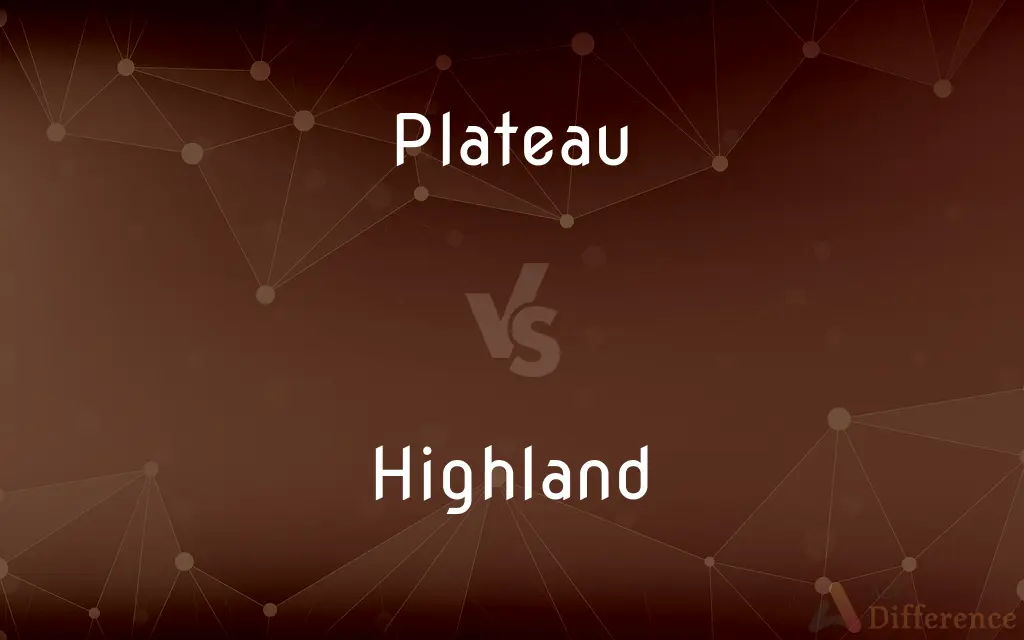Plateau vs. Highland — What's the Difference?
By Tayyaba Rehman & Fiza Rafique — Updated on April 2, 2024
Plateau refers to a flat, elevated landform, while highland denotes a general area of high elevation, often rugged and less uniformly flat.

Difference Between Plateau and Highland
Table of Contents
ADVERTISEMENT
Key Differences
A plateau is characterized by its relatively flat terrain at a higher elevation than the surrounding area, often formed by geological processes such as volcanic activity or the uplift of the earth's crust. Plateaus can be found around the world, serving as areas for settlement, agriculture, or as natural barriers. In contrast, highlands refer to any land area that is elevated above the surrounding region, typically featuring a variety of terrain including mountains, hills, and plateaus. Highlands are often associated with mountainous regions, showcasing more topographical diversity and complexity than a plateau.
The formation of plateaus is usually the result of tectonic activity, lava outpouring, or erosion that leaves a flat area elevated above the surrounding landscape. This process results in a distinct landform with steep sides and a flat top, commonly found in both arid and humid environments. Highlands, however, encompass a broader range of elevated terrains, formed through a variety of geological processes, including the collision of tectonic plates that create mountains and uplifted areas. As a result, highlands can include plateaus within their expanse, alongside other elevated features.
Plateaus are known for their significant ecological and climatic impacts, often creating unique habitats due to their elevation and isolation. For example, the Tibetan Plateau, known as the "Roof of the World," influences climate patterns across Asia. Meanwhile, highlands, with their varied terrain, support diverse ecosystems and climates within the same region, from dense forests to bare rock, depending on altitude, latitude, and other environmental factors. Highlands can thus offer a wider range of biodiversity and climatic zones than plateaus.
In human geography, plateaus are often areas of significant agricultural and settlement importance, providing flat lands at high elevations that are conducive to certain types of farming and habitation. High altitude plateaus like those in Ethiopia are renowned for their agricultural productivity. On the other hand, highlands might be less densely populated due to their rugged terrain but are valued for their water resources, as they often form the headwaters of major river systems, and for their cultural and historical significance in many parts of the world.
Despite their differences, both plateaus and highlands play crucial roles in the earth’s geography, influencing weather patterns, human settlement, and biodiversity. The distinction between them lies in their formation, terrain, and the ecological and human activities they support. While plateaus offer expansive flat areas at high elevations, highlands encompass a mix of elevated terrains, each contributing uniquely to the planet's diversity.
ADVERTISEMENT
Comparison Chart
Definition
Flat, elevated landform
General area of high elevation, often rugged
Terrain
Relatively flat terrain
Varied, including mountains, hills, and plateaus
Formation
Tectonic activity, lava outpouring, erosion
Variety of geological processes, including tectonic collisions
Ecological Impact
Unique habitats due to elevation and isolation
Diverse ecosystems and climates
Human Geography
Areas of agricultural and settlement importance
Less densely populated, valued for water resources and cultural significance
Compare with Definitions
Plateau
A flat, elevated area rising sharply above surrounding land.
The Colorado Plateau is known for its stunning landscapes.
Highland
An area of high land, often mountainous.
The Scottish Highlands are renowned for their rugged beauty.
Plateau
Can be found in both arid and humid environments.
The Deccan Plateau is crucial for India's agriculture.
Highland
Supports diverse ecosystems.
The Andean highlands host a wide range of flora and fauna.
Plateau
Characterized by steep edges and a flat top.
The plateau's steep cliffs are a challenge for climbers.
Highland
Formed by various geological processes.
The collision of tectonic plates has created many highlands.
Plateau
Formed by geological processes such as volcanic activity.
Lava plateaus form when lava spreads over large areas.
Highland
Valued for water resources and cultural heritage.
Highlands often contain the sources of major rivers.
Plateau
Influences climate and biodiversity.
The Tibetan Plateau affects weather patterns across Asia.
Highland
Includes a range of elevated terrains.
Highlands feature a mix of mountains, hills, and plateaus.
Plateau
In geology and physical geography, a plateau ( , , or ; French: [pla.to]; plural plateaus or plateaux), also called a high plain or a tableland, is an area of a highland consisting of flat terrain, that is raised sharply above the surrounding area on at least one side. Often one or more sides have deep hills.
Highland
Highlands or uplands are any mountainous region or elevated mountainous plateau. Generally speaking, upland (or uplands) refers to ranges of hills, typically up to 500–600 m (1,600–2,000 ft).
Plateau
An area of fairly level high ground.
Highland
Elevated land.
Plateau
A state of little or no change following a period of activity or progress
The peace process had reached a plateau
Highland
HighlandsA mountainous or hilly section of a country.
Plateau
Reach a state of little or no change after a period of activity or progress
The industry's problems have plateaued out
Highland
Any of a variety of hardy beef cattle developed in the Scottish Highlands and having long horns and a shaggy coat.Also called Scottish Highland.
Plateau
An elevated, comparatively level expanse of land; a tableland.
Highland
Of, relating to, or characteristic of a highland.
Plateau
A relatively stable level, period, or state
Mortgage rates declined, then reached a plateau.
Highland
A high area; land that is higher than surrounding areas.
Plateau
To reach a stable level; level off
"The tension seemed to grow by degrees, then it plateaued" (Tom Clancy).
Highland
Elevated or mountainous land; (often in the pl.) an elevated region or country; as, the Highlands of Scotland.
Plateau
A largely level expanse of land at a high elevation; tableland.
Highland
Of, located in, or characteristic of high or hilly country. Contrasted to lowland.
Plateau
(of a varying quantity) A comparatively stable level after a period of increase.
Highland
Elevated (e.g., mountainous) land
Plateau
(dated) An ornamental dish for the table; a tray or salver.
Highland
Used of high or hilly country
Plateau
A notable level of attainment or achievement.
Plateau
(intransitive) (of a varying quantity) To reach a stable level after a period of increase; to level off.
Plateau
A flat surface; especially, a broad, level, elevated area of land; a table-land.
Plateau
An ornamental dish for the table; a tray or salver.
Plateau
A relatively flat highland
Common Curiosities
What factors contribute to the formation of plateaus?
Tectonic activity, lava outpouring, and erosion are key factors in plateau formation.
Can a plateau be part of a highland?
Yes, plateaus can be components of highlands, alongside other elevated features.
How do plateaus influence human settlement?
Their flat terrain at high elevations is suitable for agriculture and settlement.
What is a plateau?
A plateau is a flat, elevated landform with steep sides, formed by geological processes.
Why are highlands important for biodiversity?
Their varied terrain and climates support a wide range of ecosystems and species.
How do highlands differ from plateaus?
Highlands encompass a broader area of elevated land, including mountains and plateaus, and feature more varied terrain.
Why are highlands valued for their water resources?
They often contain the headwaters of major rivers, crucial for downstream ecosystems and human use.
Can the terrain of highlands be flat?
While highlands are often rugged, they can include flat areas, such as plateaus, within their expanse.
What role do plateaus play in climate patterns?
Plateaus can affect local and regional climate patterns due to their elevation and isolation.
How does biodiversity in highlands compare to other regions?
Highlands often have higher biodiversity due to their varied climates and isolated habitats.
What makes highlands culturally significant?
Their unique landscapes and isolation have fostered distinct cultural practices and histories.
What geological processes form highlands?
Highlands are formed through tectonic collisions, erosion, and other geological activities.
Are plateaus found in specific climates?
Plateaus can exist in both arid and humid environments, impacting local climates.
How do humans adapt to living in highlands?
Humans adapt through specialized agriculture, water management, and housing suited to the rugged terrain and climate.
Are all plateaus suitable for agriculture?
Not all, but many plateaus, especially those in humid regions, are valuable for certain types of farming.
Share Your Discovery

Previous Comparison
Curtain vs. Blinds
Next Comparison
Mallard vs. TealAuthor Spotlight
Written by
Tayyaba RehmanTayyaba Rehman is a distinguished writer, currently serving as a primary contributor to askdifference.com. As a researcher in semantics and etymology, Tayyaba's passion for the complexity of languages and their distinctions has found a perfect home on the platform. Tayyaba delves into the intricacies of language, distinguishing between commonly confused words and phrases, thereby providing clarity for readers worldwide.
Co-written by
Fiza RafiqueFiza Rafique is a skilled content writer at AskDifference.com, where she meticulously refines and enhances written pieces. Drawing from her vast editorial expertise, Fiza ensures clarity, accuracy, and precision in every article. Passionate about language, she continually seeks to elevate the quality of content for readers worldwide.













































